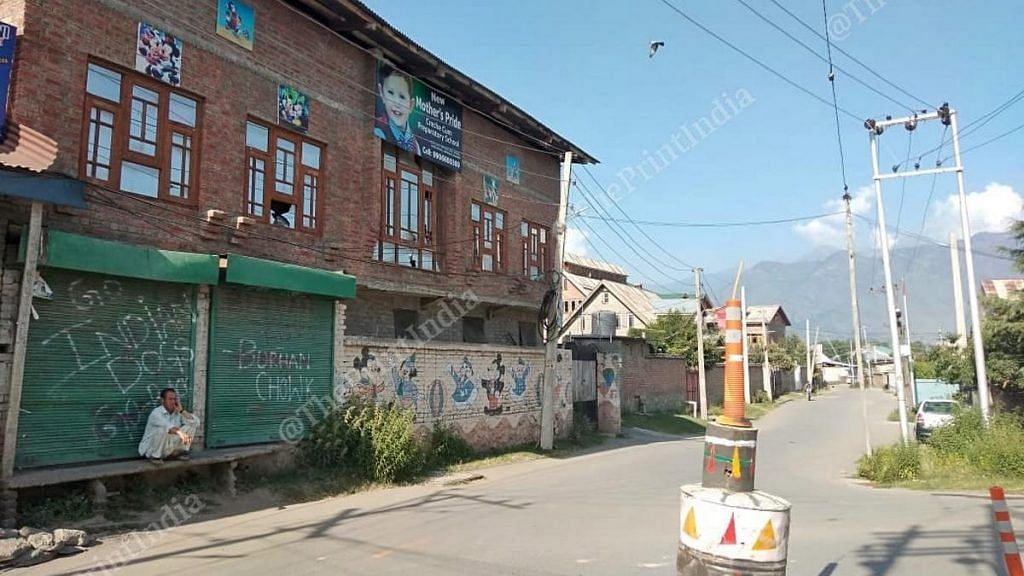National Security Adviser Ajit Doval during an interaction with a select group of journalists last week said, “We would like all restrictions to go (in Kashmir) but it depends on how Pakistan behaves”.
NSA Doval’s statement is a tacit admission that despite India’s diplomatic and military measures, Pakistan still controls the narrative and the security situation in J&K is contingent on its ‘behaviour’. This reflects badly on our national security strategy.
To make matters worse, after the abrogation of Article 370, our human intelligence sources in J&K have dried up, and this can have serious implications for India’s counter-terrorism strategy.
With just 250 terrorists active in the region and no extraordinary mobilisation of Pakistani troops along the LoC as feared, India must now once again rely on its time-tested model of people-friendly operations that strictly adhere to the law of the land.
Also read: Army’s new headache in Jammu and Kashmir — Pakistan instigating civilians to march to LoC
A rather quiet LoC
In the last one month, Pakistan has gone on a diplomatic offensive, running a campaign against India based on half-truths and Twitter gossip. This campaign has had little or no impact in the international circles.
Despite speculative reports in a section of the media, there has been no extraordinary movement of troops by Pakistan near the Line of Control (LoC). The LoC, in fact, has been rather quiet.
It requires no reiteration that Pakistan has been steadfast in pursuing its long-term strategy of a hybrid war in J&K, and I do not foresee any change in that. The current lull along the LoC is primarily due to the security precautions taken by India.
Also, Pakistan does not want to jeopardise its diplomatic offensive or its case before the FATF. In a nutshell, the ‘restrictions’ imposed in J&K indirectly suit Pakistan.
Lull before the storm?
According to NSA Doval, 230 terrorists are waiting to infiltrate (and some may have). In the near future, Pakistan will intensify the hybrid war to take advantage of the increased alienation of the people in Kashmir, with even the pro-India voices likely to join the radicals after the abrogation of Article 370.
All actions of the Narendra Modi government and the security forces are only focused on forestalling the proverbial ‘storm’ – the violent protests that are likely to break out once the restrictions are lifted.
Also read: How this General saw Kashmir 50 yrs ago – No signs of fundamentalism, Army had people’s trust
Counter-terror operations take a hit
At one level, the security measures may have been successful in keeping violent protests in check.
At another level, they have jeopardised the counter-terror operations. Since 5 August, only two terrorists have been killed and two suspected terrorists apprehended.
As per the J&K police chief, nearly 250 terrorists are currently active in the region. Logically, with additional security forces and ‘restrictions’ in place, this period should have been utilised to wipe out these terrorists.
But why has this not happened?
This is because our main source of information – human intelligence – has dried up. Due to the absolute alienation of the people in Kashmir, ties have been snapped with the local information channels.
This is a very disturbing trend and is likely to jeopardise our counter-terror operations in future. The clampdown is also preventing interception of terrorist communications and contact with active sources. Another important source of information – the local police (at thana level and below) – has also become defunct because of the administration’s insensitive handling.
The ‘civil disobedience’ movement, which is taking shape in the Valley, is a cause of worry too. It is currently being dismissed with a casual ‘so what?’. But if the restrictions continue and the movement gains traction, India will start losing the support of the international community.
The Narendra Modi government and the security forces need to address these issues urgently.
Defining political & military aims
Rather than merely managing the situation post abrogation of Article 370, and waiting for Pakistan’s ‘behaviour’ to change, we need to seize the moment.
Our strategy must not be contingent on Pakistan’s ‘behaviour’, but based on clearly defined political and military aims. Politically, we need focus on winning the hearts and minds of the people and engaging with the ‘local leadership’. As a first step, all restrictions need to removed.
There is no point saying there are no credible leaders left in Jammu and Kashmir. Either create a credible leadership or negotiate with the pro-India voices currently in detention. Nothing can be worse that imposing ‘political stooges’ on the people.
The military needs to revive its human intelligence grid. The counter-infiltration campaign must be strengthened with additional troops and increased surveillance.
So far, our political strategy has been driven by the military strategy. This approach only leads to conflict management, not conflict resolution. It is time to reverse the process.
Also read: UN rights chief asks India to ease Kashmir lockdown, raises NRC list controversy
Lt Gen H S Panag PVSM, AVSM (R) served in the Indian Army for 40 years. He was GOC in C Northern Command and Central Command. Post retirement, he was Member of Armed Forces Tribunal. Views are personal.
